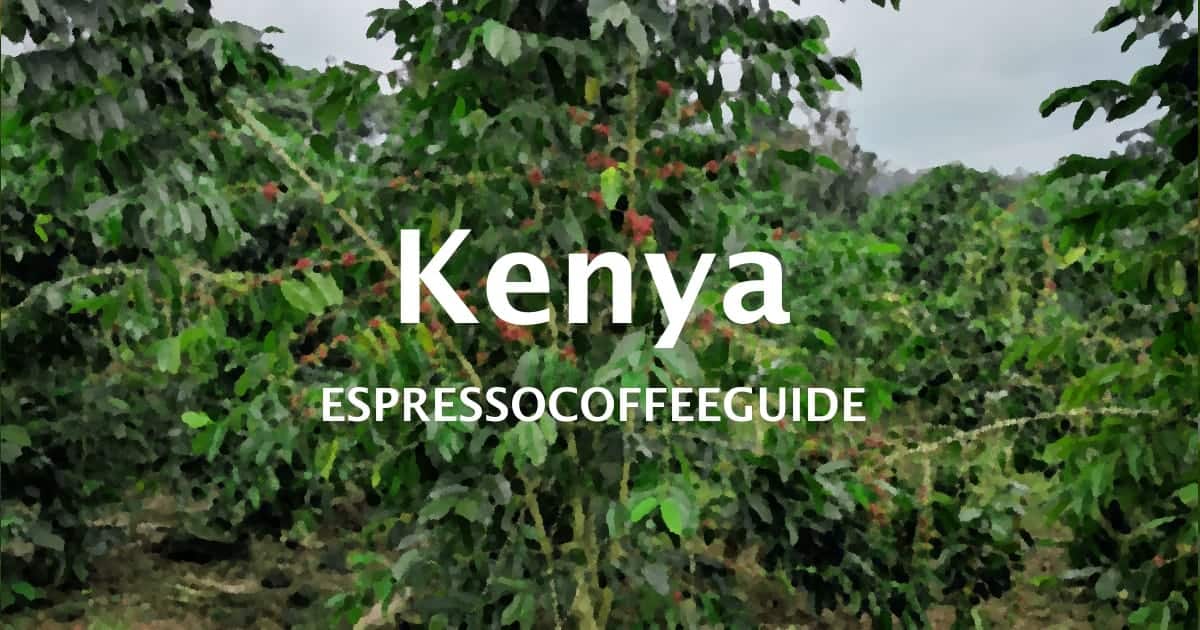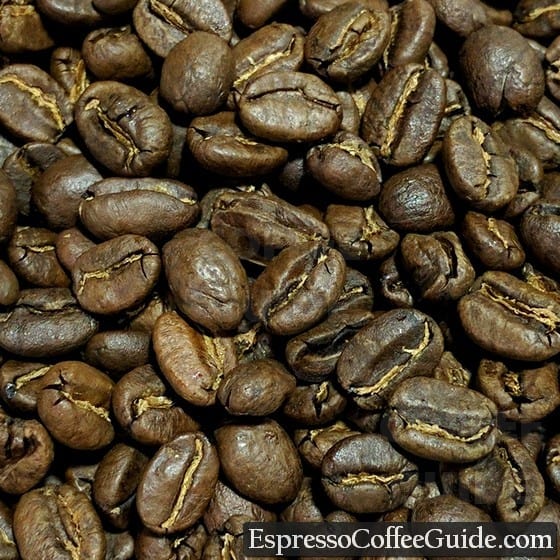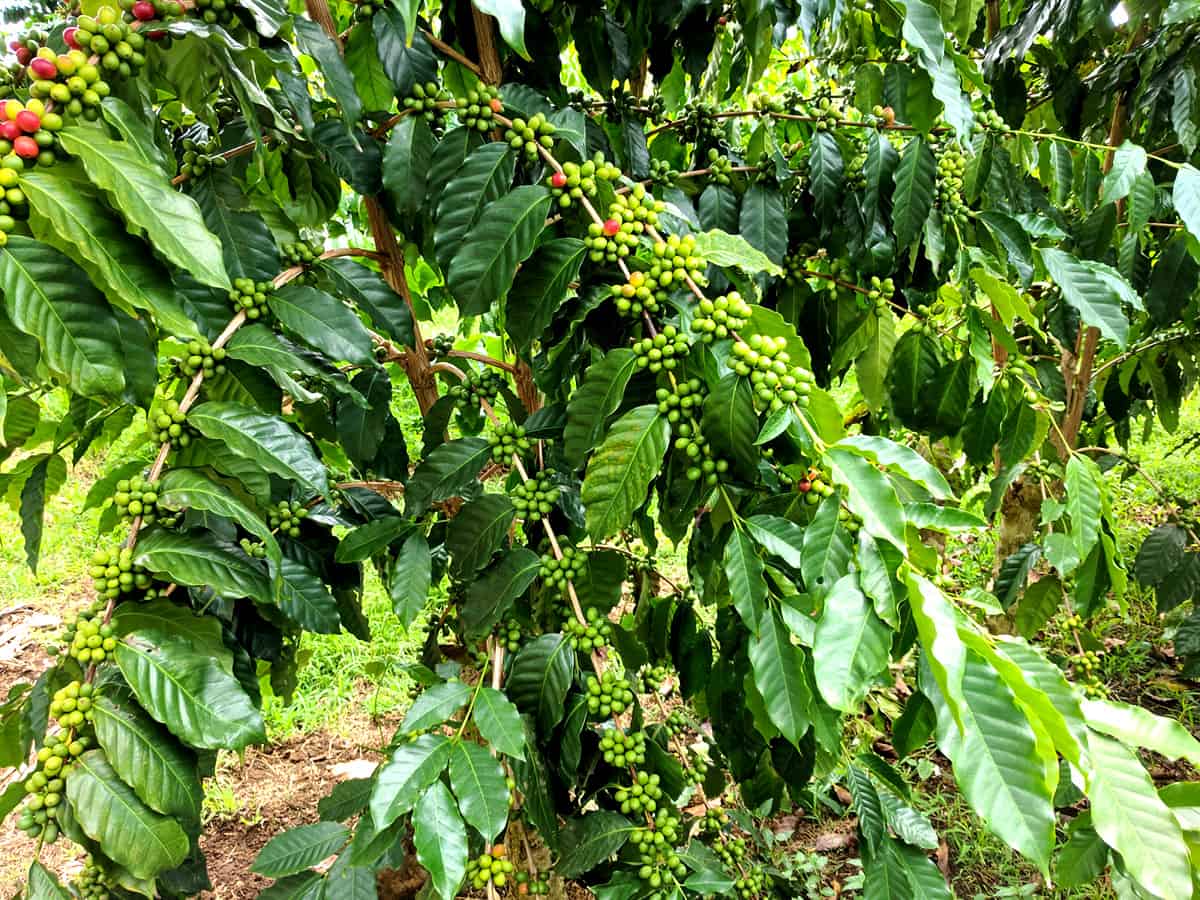Grown at elevations higher than 6,600 feet above sea level, Kenya AA is considered to be one of the world's best coffee beans. The high growing altitudes means that the beans grow slower than at low altitudes, providing more nutrients and allowing them more time to develop their flavors and mature.

- Region: Kenya
- Growing Altitude: 1,700 - 1,800 meters
- Variety: Arabica
- Harvest Period: November - December
- Milling Process: Fully Washed, Sun Dried on Raised Beds
- Aroma: Fresh, Floral
- Flavour: Bergamot, Berries, Lemongrass
- Body: Rich, Heavy
- Acidity: Bright
Jump to:
The high plateaus of Kenya produce coffee beans with a full body and rich, strong, flavor with a very pleasant acidity. The fragrant aroma also has floral tones, with a winey finish/aftertaste that also has citrus and berry overtones.

Grading
The biggest screen size in the Kenya coffee grading system is E (Elephant), followed by PB (Peaberry) and AA, which means the green coffee bean is just a little more than one-fourth inch (¼") in diameter. While AA is the most commonly available on the market, others can sometimes be found but don't drastically affect the flavor.
The specifications for Kenya AA: Screen 21; retained on 18; diameter 7.2 mm.
The elevation of Kenya's coffee farms qualify these as Strictly High Grown (SHG) / Strictly Hard Bean (SHB) - the best of the best.
Coffee review
Kenya AA is often reviewed as one of the world's brightest coffee beans, though of course this is a matter of debate among coffee cuppers as well as every day specialty coffee lovers.
What is certain, however, is that Kenya AA is one of the finest coffee beans known and also one of the coffees most favored by coffee connoisseurs. The largest and best coffee beans from Kenya are grades Kenya AA and peaberry. Kenya AB is frequently rated high as well and makes an acceptable substitute when AA is not available.
Green Coffee

The fact that Kenya AA has consistently been one of the world's best rated coffees means there's a demand for it, and is a great way to introduce people to specialty coffee roasting. Whether buying for a commercial roasting operation or just your own home use, this is definitely one of the must-haves.
The high quality (and price) of the Kenya AA means that it's not frequently used in blends, but rather simply sold as a single origin coffee.
Pricing
The typical fluctuations in the market year-to-year means that prices go up and down. This is sometimes tied to market conditions (supply and demand) and other times simply raw goods costs - fertilizer, processing cost, etc. Retail prices remain fairly steady, typically changing once per year or several years depending on how volatile the market is.
Wholesale green coffee from a broker/importer on the other hand, is typically priced with a week or two maximum validity to accommodate for smaller changes that are amplified in large volumes.
Buying unroasted green coffee beans to roast at home can be done starting with as little as a single pound from online distributors and wholesalers. The best quality check is to simply order a small quantity to try, review it for yourself, and go back for bulk purchases once everything checks out.
Roasting
The best Kenya AA coffee is often given a Medium Roast to allow the coffee's natural brightness to shine. Roasting it darker results in a loss of the nuances that make this bean so great, though can be done for those who prefer their coffees with more "coffee" flavour.
As with any single origin Arabica coffee, fresh roasted in whatever roast you like best will deliver better results than old, stale coffee that may have been sitting in distribution warehouses and on shelves for months. When looking at buying brands from large retailers such as Amazon and Starbucks, it's important to make sure the coffee is labeled as fresh roasted with a clear explanation about what that means - some companies label "fresh roasted when packaged", when it could have been packaged months ago.
Organic Kenyan coffee isn't seen very often, but not for any negative reasons. The coffee industry in Kenya is one of the better regulated, with high quality standards that do well without Fair Trade or Organic certifications.
Buying coffee
The best way to buy in bulk is to buy fresh roasted, frequently. Buying hundreds of pounds just to have it sit around will cause the coffee to go stale, and orders can often by split into smaller, weekly shipments to keep the quality high. As shipping cost as a percentage of the total order gets smaller as the order size goes up, with boxes of 50-lb being shippable by common courier.
When looking for quantities in the multiple bag (132/150-lb) region, careful planning needs to be done to provide enough lead time for the supplier. A single bag needs to be shipped on a pallet/skid, but is highly inefficient as the cost for this can significantly add to the price. Typically, multiple bags should be ordered together to economize the shipping cost.
Buy Kenya Coffee Beans
- ✔️ Fresh roasted to order
- ✔️ 100% high qualtiy Arabica coffee
- ✔️ Custom grind (or whole bean)
- ✔️ 1-way valve, laminate bag (for freshness)
- ✔️ Bulk discounts
Green Coffee Production
| Year | 60kg bags | Coffee grown |
| 2016 | 783,333 bags | 103,399,956 pounds |
| 2015 | 789,167 bags | 104,170,057 pounds |
| 2014 | 764,763 bags | 100,948,703 pounds |
| 2013 | 837,950 bags | 110,609,413 pounds |
| 2012 | 875,446 bags | 115,558,806 pounds |
Green Coffee Exports
| Year | 60kg bags | Coffee exported |
| 2016 | 0 | 0 pounds |
| 2015 | 739,170 | 97,570,440 pounds |
| 2014 | 719,760 | 95,008,320 pounds |
| 2013 | 782,950 | 103,349,400 pounds |
| 2012 | 819,450 | 108,167,400 pounds |
Data may not be available for the most recent year.
Source: ICO
Facts

























produced 104,170,057 lbs
exported 97,570,440 lbs
That's over 94% exported!
Sounds like a lot? It's actually 0.5% of the coffee grown worldwide.

(that's 5,578 to 5,906 ft)
Source: ICO


Milly
I am from kenya..looking for coffee market world wide..am a farmer
Ray Hendler
Could someone suggest/recommend a source in Capetown of Medium/Dark roast Kenyan beans.
I buy only 1Kg at a time. say twice a month, High domestic/social user.
Regards
Ray
Diane
Can someone recommend a green Kenyan bean not too acidic? I buy only 1Kg 2x perm month
Mpho Nthite
Hello, may I have contact number as I would to like to buy in 60 kg bags. And also how much is the price of 60kg bag
ahmed hawi
ain't nothing but the best coffee in the world, whole bean or grounded..for french press it is sick.
James
very informative. I am learning more about coffee and would like to start selling and hosting cupping events for armature tasters. your website is quite comprehensive on information. thank you
Robert Blake
Great Info!
richard lee
please let me know Kenya AA Coffee all of the cost thanks